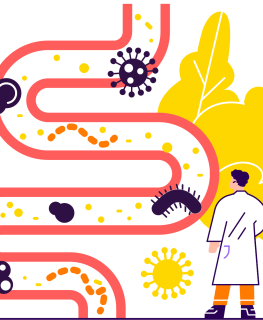Irritable bowel syndrome (IBS) is thought to affect around 10-15% of the global population. Prevalence rates vary between countries and although more people seem to have IBS than previously this may actually just reflect the increasing awareness of the condition. Regardless of prevalence, IBS can significantly impact quality of life so here at The Gut Health Clinic we want to help as many people as possible take control of their symptoms through personalised, evidence-based nutritional care.
What is IBS and how do I know if I am having a flare-up?
IBS is a disorder of gut-brain interaction, characterised by recurrent abdominal pain which may be related to opening your bowels or a change in toilet habit, such as constipation, diarrhoea or a combination of both. Whilst we don’t know the exact cause of IBS, it may be linked to genetics, gender, stress, illness or an imbalance in the gut microbiome.
You may notice the following symptoms with an IBS flare up):
- Constipation2 (Type 1-2 stools, less than 3 movements a week)
- Diarrhoea2 (Type 6-7 stools)
- Gut pain
- Bloating
- An increase in passing a lot of wind (flatulence)
- Nausea

What causes an IBS flare-up?
Flare-ups can last for a few hours to a few weeks depending on what has triggered the episode and how well you are able to manage symptoms.
Common triggers are:
- Caffeine
- Spicy food (more so for those with diarrhoea and if you’re male)
- Alcohol
- Very high-fat meals
- Poor sleep
- Stress and anxiety
- Illness or antibiotic use
There are also some misconceptions around IBS triggers:
- Dairy – which is unlikely to cause IBS symptoms (unless you have lactose intolerance or a dairy allergy)
- Gluten (unless you have coeliac disease)
How can you manage a flare-up?
IBS flare ups can be uncomfortable and have a significant impact on your quality of life and ability to do everyday activities. There are some first line strategies that can improve symptoms; some things work differently for different people so you might want to keep a note of what you’ve tried, and what helped you feel better.
Dietary approaches
For those with diarrhoea:
- Reduce intake of alcohol, caffeine, fizzy drinks and, spicy food.
- Limit intake of gas producing food such as beans, pulses, sprouts, cauliflower to one serving per day.
- Include an oat based breakfast as the soluble fibre can help bulk up and firm stools/
- A lower FODMAP diet (it’s best to try the other suggestions first as some may find it tricky – always speak with a dietitian before starting). Remember this doesn’t mean a no-FODMAP diet, just lower your FODMAP intake during the period of the flare, and then return to your personalised FODMAP diet that has been formulated with guidance from a specialist dietitian once things are more settled.
For those with constipation:
- Gradually increase fibre intake, for example mix beans in with a chilli, sprinkle seeds on your salad and add an extra portion of vegetables each day (remember those 30 plant points each week!)
- Ground linseed, gradually build up to 1-3 tablespoons a day, each with an extra glass of water
- Make sure you are drinking enough fluid, aim for 6-8 glasses per day to help bind with the extra fibre and soften your stools
- 1-2 kiwifruit per day
Non-diet approaches
- There is good research that various probiotics can help reduce IBS symptoms. There are many types available with different benefits for you to choose from – here’s a handy list
- Working on the gut-brain axis e.g., gut-directed hypnotherapy, CBT and other mindfulness approaches can be really helpful and may even prevent stress related flare ups if used on a tough day
- Gentle movement or stretching can help with constipation and bloating, as well as supporting the gut-brain axis
- Bowel massage or a gut directed yoga flow can help get things moving and relieve trapped gas (there are examples in Dr Megan Rossi’s book ‘Eat Yourself Healthy’ and online)
There’s also a range of medications that can help some individuals – this includes over the counter medications such as Buscopan, as well as “central neuromodulators” which target the gut-brain pain pathway. Peppermint oil capsules can relax tense muscles in the intestine and studies have found that a peppermint oil supplement can significantly reduce tummy pain as well as help with bloating and excess wind.













